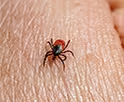Why Are Measles Outbreaks Returning? The Unexpected Causes of a Resurgence
The Measles Threat: How Low Vaccination Rates Put Us All at Risk
Reading time : 1 minute,
Discovery Chepe Id-794-SAL
Published in
08-26-2025

The distinctive rash on the skin of this child is a crucial sign of a measles infection. The eruptions, which can merge together, are a clear indicator of the disease.
In recent years, health experts have raised alarms over the unexpected return of measles outbreaks worldwide. A disease once considered under control thanks to vaccines is now resurfacing in multiple countries, sparking questions about why this is happening and what it means for public health.
1- Decline in vaccination coverage
The primary reason for the resurgence of measles is the decline in vaccination rates. According to the World Health Organization, at least 95% of the population must be vaccinated to maintain herd immunity. However, misinformation, logistical challenges in low-income regions, and vaccine hesitancy in developed countries have weakened this protective barrier.

The Measles Threat: How Low Vaccination Rates Put Us All at Risk
2- Global inequalities in health systems
In many countries, especially those facing conflicts or economic crises, routine immunization programs have been disrupted. Children are missing key doses, and health infrastructures struggle to reach vulnerable populations. This has created fertile ground for outbreaks to emerge and spread quickly.
3- Impact of the COVID-19 pandemic
The COVID-19 crisis diverted resources and attention away from other essential health services. Lockdowns and restrictions delayed vaccination campaigns, leaving millions of children unprotected against diseases like measles. Experts warn that the aftershocks of this disruption are still being felt today.
4- Spread through travel and migration
In our interconnected world, measles spreads rapidly across borders. A single infected traveler can ignite an outbreak in a community where vaccination coverage is insufficient. Health agencies such as the Centers for Disease Control and Prevention (CDC) have repeatedly stressed the importance of keeping immunization rates high to prevent cross-border epidemics.
Why this matters
Measles is not a mild disease. It can cause severe complications such as pneumonia, encephalitis, and even death. The return of outbreaks is a reminder of what happens when collective immunity is compromised. While some communities downplay the risks, history shows that measles is a dangerous virus that takes advantage of every weakness in public health systems.
What can be done
a) Governments must invest in stronger vaccination campaigns, especially in underserved areas.
b) Public awareness campaigns should fight misinformation with science-based communication.
c) International cooperation is essential, as viruses do not respect borders.
A human responsibility
The return of measles outbreaks is not just a medical issue but a collective failure of global society to maintain progress against preventable diseases. As public health experts emphasize, vaccines remain one of the most effective tools in human history. Reinforcing trust, accessibility, and commitment to vaccination is the only way to prevent measles from becoming a recurring global threat.
See Also
Discovery Chepe
Most read...















